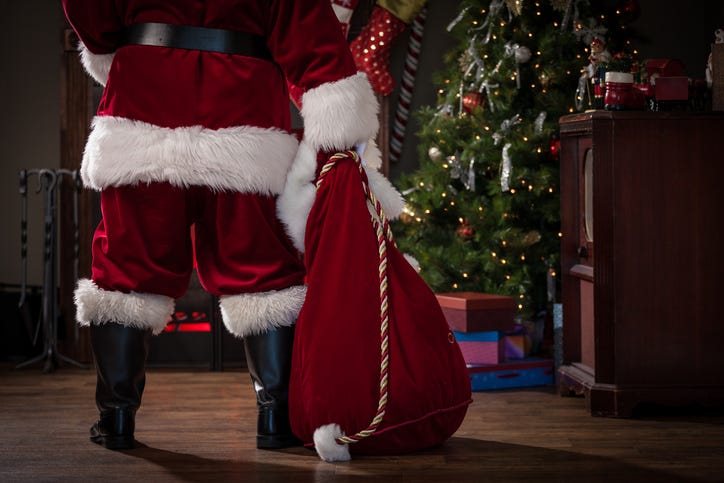This may not come as much of a surprise to you, but I’m the kind of dad who likes to explain things.
My kids and I will be riding in the car, and one of them will spot something out the window that piques their interest. They’ll ask an innocent enough question—or maybe just make an observation that’s not even technically a question—and they’ll be rewarded with a far lengthier answer than they sought. Something as innocuous as “Daddy, what are they building over there?” can send me into a ten-minute-long soliloquy on the pros and cons of precast concrete construction even though they tuned out as soon as I said “a hospital”.
Nevertheless, I persist.
I’ll take any opportunity I can to share the little bits of knowledge that I have about the world, because I want to educate them at every turn possible. I believe in telling kids the truth as much as possible, and explaining the world around them in the frankest, plainest, most honest way I can.
… eleven months out of the year.
Like countless millions of other Christmas-celebrating parents of young children around the world, I spend the entire month of December weaving an elaborate fiction for my kids; a web of lies, fabrications and obfuscations that defies all logic and would crumble under any sort of careful analysis. I lie to them every day, and when they question my lies, I double down with even more lies.
I tell them that if they are good, a jolly old elf named Santa Claus will bring them presents.
I tell them that he will come into our house—which I have repeatedly assured them is fully secure from any sort of intrusion—while we are all sleeping. He will do this in defiance of my past assurances that if anyone did come into our house at night, either I or one of our dogs would hear them and scare them away.
He will come into our house and no one will notice until after he’s gone, I explain.
I provide the caveat, of course, that he will break into our house if and only if they have displayed good behavior throughout the entire past year, something he is able to meticulously monitor remotely1. I hope that they do not notice that their position relative to the unseen threshold for qualification as “good” or "bad" always seems to come down right down to “good behavior in the last three weeks of the year”, with the previous eleven months of behavior having had as much import as college basketball’s regular season.
I tell them that he will come down our little-used chimney to get into our house, and that he can fit down it even in spite of their astute observation that the top of our chimney isn’t nearly large enough for the generously-proportioned man they’ve seen depicted in so many cartoons and Coca-Cola ads to negotiate.
Magic, I say, falling back on the last resort of the unqualified science fiction writer.
He can get it down by magic.
I do all of this lying with a low-grade sense of terror underpinning my every action, a simmering fear that today will be the day that I make the one seemingly-minor slip-up that sends the whole house of cards crashing down, an errant comment or missed detail leading to the horrifying revelation that I’ve been the one eating those cookies they set out every year. I wince at every Christmas movie we watch—and there are far too many that do this—that features some snot-nosed kid character insisting that “Santa’s not real, he’s just your parents”.
This character is invariably proven wrong within the next 90 minutes, but I’d frankly prefer that they not even know there’s a debate on the matter.
No, no, Santa’s definitely real. That one talking puppy in Santa Buddies is just a jerk.
Of course, I’m not afraid to put a few guardrails up in the course of our world-building.
First of all, Santa does not have unlimited resources. It’s never stated exactly what Santa’s per-child budget is, but I can confidently steer them to an understanding that the LEGO Ninjago City set is too much to ask for from either him or me.
Second, Santa only brings one or two gifts. The rest comes from Mom and Dad, and we’ll admit that much from the start. This might limit the impact of Santa’s power to compel good behavior, but it’s vital to the enterprise for two very different reasons. First, it explains why they might get more than some other kids. We are privileged, but we are not favored, and it’s important to learn that distinction early on. Santa doesn’t love us more than anyone else; Mom and Dad are just lucky enough to have the resources to provide more.
Second, it makes it a lot easier to cover any slip-ups when they see wrapping paper or shopping bags or shipping boxes lying around, because yeah, a lot of this is from us, what of it?
This entire charade—this whole this years-long con, this towering and teetering edifice of fibs, falsehoods and bald-faced lies—it exists to what end? To cede credit for being the one who actually got them the thing they’d asked for repeatedly and only heard repeated denials from us for? Taken in that light, the whole venture is a tremendous own-goal, a hell of a lot of work and stress and struggle only to make ourselves seem less fun as parents, a metric in which we frankly don’t have a ton of wiggle room to begin with.
But there’s more to it than that, of course.
I both hope and believe that my kids know that their mother and I love them. Frankly, I hope they take that love for granted and don’t need proof of it.
The purpose of our Big Lie, our Christmastime Conspiracy, our Santa Con, is to teach them to believe that there is more out there for them than what we can give them. That there is goodness in the world that defies all logic and explanation. That there is someone out there who loves you and cares for you and wants good things for you even though you’ve never met them and can’t actually prove they exist. They’re there, and they’re real.
That magic does exist if only we’re willing to ignore the doubters and believe in it.
If that’s a lie, then it’s a lie that I’m willing to fight on. Santa might not be real, but the rest of that stuff about good in the world is, even if it’s hard to see most of the time.
Now, if you’ll excuse me, I have to go hire a man in a red suit to catfish my kids.
—Scott Hines (@actioncookbook)






There's a fun little book called "The Physics of Christmas" which has explanations for all that stuff like how to get a fat man down a chimney, the aerodynamics of reindeer, why Santa is fat in the first place, etc. As a dad, it's fun to make up reasons and/or to fall back on the "magic and wonder" aspects but it does lend a certain gravitas to have a textbook laying around so you can "hmmm, that's a good question, let me go look it up" from time to time
I feel like the Polar Express plot about being able to still hear the bell is effective for papering over the stretchy-est parts of the logic. Guilt is effective for reinforcing belie- yes, I was raised Catholic why do you ask